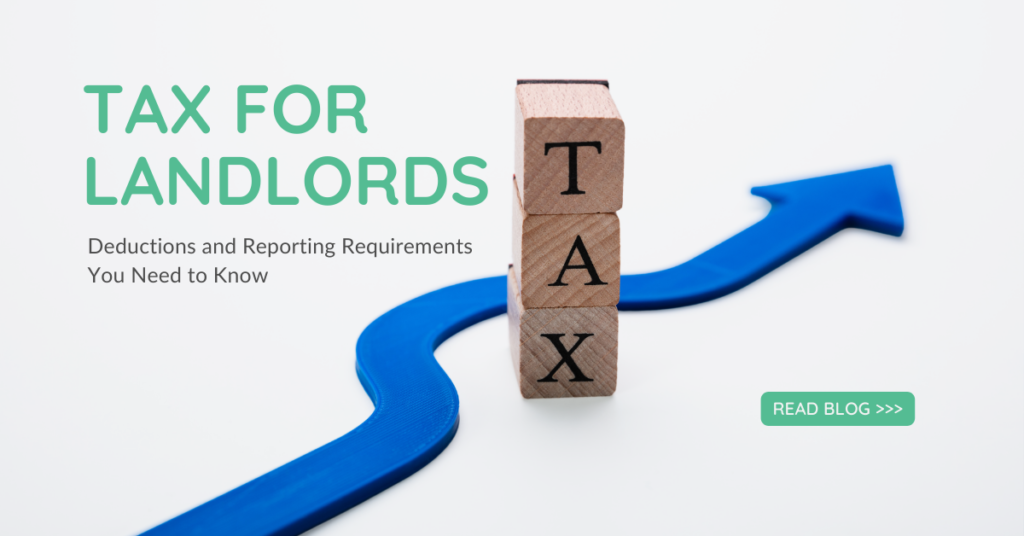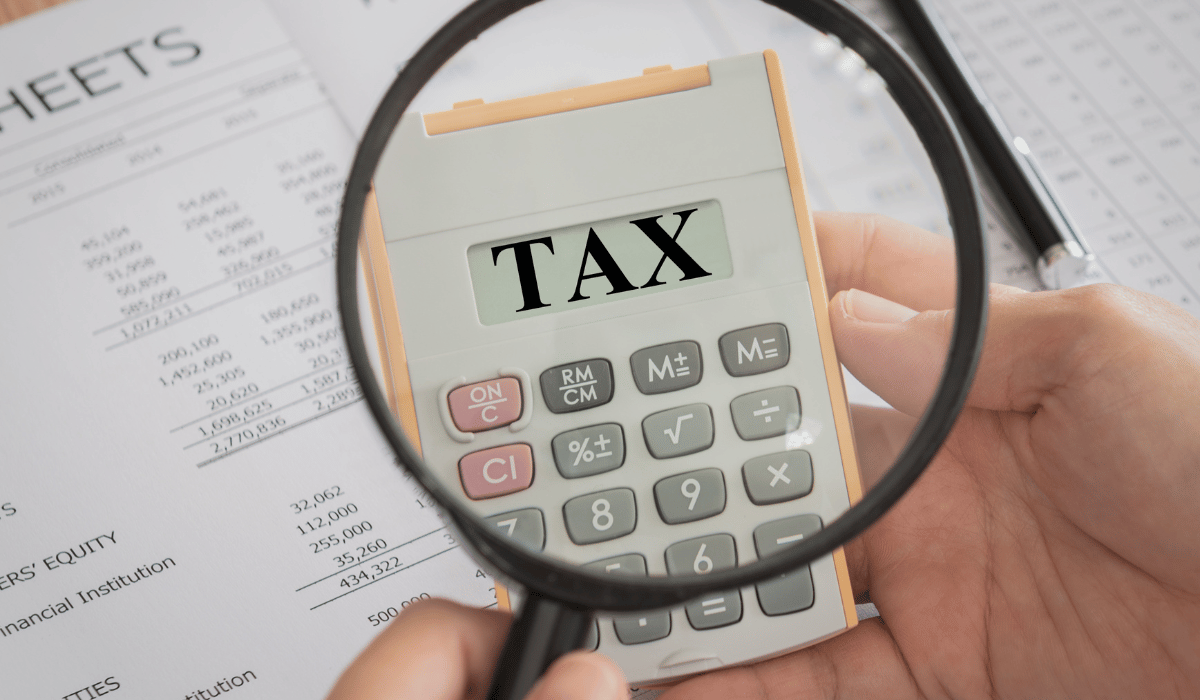Tax for Landlords: Deductions and Reporting Requirements You Need to Know
Reading Time: 5 minutesOwning rental property can be a great source of income, but come tax time, it can also add complexity. Understanding how to report your rental income and the deductions you can claim is essential for minimizing your tax liability. This guide will equip you with the knowledge to navigate tax season as a landlord. …

Owning rental property can be a great source of income, but come tax time, it can also add complexity. Understanding how to report your rental income and the deductions you can claim is essential for minimizing your tax liability. This guide will equip you with the knowledge to navigate tax season as a landlord.
Table of Contents
Understanding Rental Income and Taxes

First, let’s clarify what counts as rental income. It goes beyond the regular monthly rent payments you receive. Security deposits applied as rent, advance rent payments, and even payments made by tenants for certain utilities can be considered income and need to be reported on your tax return.
All this rental income is generally taxed as ordinary income on your federal tax return. The good news is that you can offset this income with various deductible expenses incurred while managing your rental property.
Essential Deductions for Landlords
There are several categories of expenses that qualify as deductions for landlords. Here are some of the most common:
- Operating expenses and repairs: This includes costs for maintenance, repairs, trash removal, and property management fees.
- Mortgage interest and property taxes: The interest you pay on your rental property mortgage and the property taxes you pay are deductible.
- Depreciation: This allows you to spread out the cost of the property itself over a set number of years, reducing your taxable income each year.
There are also other potential deductions you might qualify for, such as travel expenses related to maintaining the property or a home office deduction if you dedicate a specific space for managing your rentals.
Record-Keeping Tips for Landlords

Good record-keeping is crucial for maximizing your deductions and ensuring a smooth tax filing process. Organized records ensure you report all your income and claim all eligible deductions accurately. This reduces the risk of errors that could delay your refund or trigger an audit.
The IRS requires documentation to support any deductions you claim. Without proper records, you could miss out on significant tax savings. Lastly, knowing your records are in order eliminates unnecessary stress during tax season.
Building a Bulletproof Record-Keeping System
Now that we understand the importance, let’s delve into the specific documents you should keep and how to organize them:
Income Documents
- Lease agreements: These establish the rental terms, including rent amount, security deposit details, and any included utilities.
- Rent receipts or deposit slips: Document all rental income received, including cash payments, checks, and online transactions. Note the date, amount, and tenant’s name for each payment.
- Security deposit records: Track security deposits received, returned, and any deductions made for damages.
Expense Documents
- Receipts and invoices: Keep receipts for all rental property-related expenses, including repairs, maintenance, property taxes, mortgage interest, utilities (if you pay them), and property management fees.
- Canceled checks and bank statements: Supplement receipts with canceled checks and bank statements for a complete record of your financial transactions.
- Proof of business miles driven (if applicable): If you use your car for rental property maintenance or management, track the mileage with a mileage log or dedicated app.
Property Documents:
- Purchase agreement: This document details the property’s purchase price, a crucial element for calculating depreciation.
- Appraisal records: If you’ve had the property appraised, keep the records for potential depreciation adjustments or insurance purposes.
- Major improvement records: Maintain documentation for any significant improvements made to the property, as these can be depreciated over time.
Organization is Key
Develop a system for organizing your documents by category (income, expenses, property) and year. Consider using labeled folders, binders, or a digital filing system. You can also scan physical receipts and invoices to create digital backups. Cloud storage services offer secure and accessible ways to store your digital records.
The IRS generally requires keeping tax records for three years from the date you file your return. However, it’s advisable to keep records related to the property’s basis (purchase price, improvements) for as long as you own it.
Additional Considerations
Don’t forget that state tax laws can add another layer of complexity. Be sure to research any specific requirements in your state regarding rental income and property taxes.
Additionally, understanding how the sale of your rental property will be taxed is important for future planning. There may be capital gains taxes to consider, but there are also strategies like a 1031 exchange that can help you defer those taxes.
When to Seek Help from a Tax Professional

While navigating tax time as a landlord is certainly achievable, there are situations where seeking help from a tax professional can save you time, money, and peace of mind. Here are some key indicators that it might be wise to consult a pro:
Complexities of your tax situation
- Multiple rental properties: Owning multiple rentals adds layers of complexity to your tax return. A tax professional can ensure accurate record-keeping and optimize deductions for each property.
- Significant depreciation recapture: When you sell a rental property, you may have to recapture some of the depreciation you claimed in previous years. A tax professional can help you navigate this process and minimize your tax liability.
- Mixed-use property: If you live in part of the property you rent out, there are specific tax rules that apply. A tax professional can ensure you claim the appropriate deductions for the business portion.
- State and local tax considerations: Tax laws can vary significantly by state and locality. A tax professional familiar with your area can ensure you’re complying with all relevant regulations and claiming any applicable state or local deductions.
- Business entity structure: The way you hold ownership of your rental property (sole proprietorship, LLC, etc.) can impact your tax filing. A tax professional can advise on the most tax-advantageous business structure for your situation.
Needing guidance on specific deductions or credits
- Uncertain deductions: There can be gray areas regarding what qualifies as a deductible expense for rental properties. A tax professional can advise you on the deductibility of specific expenses and ensure you’re following IRS guidelines.
- Unfamiliar credits: There might be tax credits available to landlords that you’re unaware of. A tax professional can identify any potential credits that could reduce your tax burden.
- Tax audits: If you’re facing an IRS audit, having a tax professional represent you is crucial. They can ensure your records are in order and advocate for your best interests.
Conclusion
Understanding your tax obligations as a landlord is key to maximizing your profits and avoiding unnecessary tax burdens. By familiarizing yourself with the reporting requirements and the deductions available, you can approach tax time with confidence. There are also many resources available to help you, including the IRS website and qualified tax professionals. Don’t hesitate to seek additional guidance if needed.
At Green Ocean Property Management, we take the stress out of property ownership. Our experienced team handles everything from tenant screening and rent collection to maintenance and repairs. We can also connect you with tax professionals who specialize in real estate investments.
Let us focus on the day-to-day while you enjoy the peace of mind and financial benefits of owning rental property. Contact Green Ocean Property Management today for a free consultation!
Achieving Work-Life Balance Through Rental Properties
Reading Time: 6 minutesIn today’s fast-paced society, finding a balance between work and personal life has become increasingly challenging. Yet, achieving this balance is crucial for overall well-being and happiness. In this article, we will explore how rental properties can serve as a pathway to achieving work-life balance by generating passive income and providing financial freedom. Understanding…
Strategies for Maximizing Rental Property Profitability
Reading Time: 3 minutesRental property investments can be an excellent approach to generating passive income and wealth over time. However, maximizing rental property profitability requires careful planning and management. Here are some strategies for maximizing your rental property profitability. Set the Right Rental Price Setting the right rental price is vital to maximizing profitability. If you…
Eco-Friendly Landscaping Ideas for Rental Properties
Reading Time: 3 minutesEco-friendly landscaping is more than a trend; it’s a wise investment for property owners. By incorporating sustainable practices, property investors can increase their return on investment (ROI), attract environmentally conscious tenants, and fulfill their responsibility toward the environment. This article is designed for property investors managing multiple rental properties. It offers practical ideas for enhancing…








